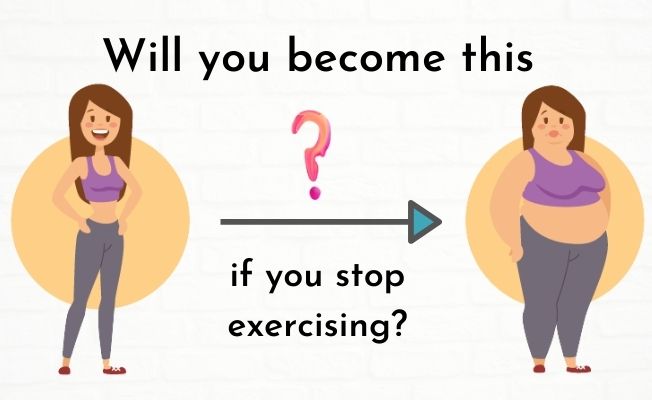There is never any dearth of advice when it comes to exercise & diet. Sadly, a large majority of them are unscientific. One of the common excuse or reasoning that we hear from people about exercising is that – “If you stop exercises, you will gain weight and hence it is not a good idea to exercise when you want to lose weight. Instead, just control the food and do a strict diet‘.
Let me tell you – THIS IS A BIG MISTAKE !
Often people advise against going to the gym or doing workouts ; their claim is that, once you start you have to continue forever and the day you stop, you will start gaining weight and all the hard work you put in will go to waste. But have we ever considered the actual scientific facts before we start believing in all this hearsay?
So let us try and decipher the actual reason for this ‘phenomenon ‘.
What is a Calorie?
The human body needs energy for its daily functions. The digestive system helps in breaking down the food and liquid we take into smaller parts and absorb the nutrients into the bloodstream which is how our body gets energy. The energy released when the body breaks down food is called calories. The energy released by the body is directly proportional to the calorie content of the food we take. The energy needs of every individual differ as per age, gender, lifestyle, etc.
We get calories of energy from the food from 3 basic macronutrients viz – protein, fat and carbohydrates.
Simple science behind weight gain & weight loss
To gain weight, we should maintain a diet which is high in calories and it should be more than the energy used by the body for daily activities. In other words, you should eat more calories than you spend. Such a calorie surplus is needed to put on weight. Likewise, in order to lose weight, we must maintain a calorie deficit, ie; the calorie consumed from the food should be lesser than the daily calorie requirement or daily calorie spend of the body.
Exercise & Weight Loss
So, a calorie deficit is what is needed to lose some weight, and you can achieve such a calorie deficit by two means –
- Eat fewer calories than your daily spend, or
- Spend more calories than your daily consumption (i. exercise)
A sensible method will be to do a combination of both!

When a person works out he will be burning an average of 300-600 calories, depending on the type and intensity of exercise. To put it differently, if you exercise your calorie need for a day is more. This means you can eat slightly more and still be within a calorie deficit! It will also make sense to compensate the calories thus burnt through food rich in protein which in turn will assist in lean muscle gain.
When you are burning extra calories through such workouts, you have the luxury of eating more.
Naturally, when you stop the exercise, your daily calorie spend is lesser. And when the calorie burn declines, the food intake also should be adjusted so that there is a balance between the calories-in vs calories-out. The imbalance in calorie intake and output is the reason for weight loss or weight gain!
So if you stop exercises, you no longer have the luxury of eating more. If you gain weight after stopping exercises is because you reduced your calorie spend but did not reduce your calorie input also accordingly!
Weight gain or weight loss is not related to exercise; rather it depends on calorie surplus or calorie deficit. If you are exercising, there is a very high chance that you are on a calorie deficit and you will lose weight. And if you stop exercises and continue to eat the same old quantity of food, then you will be on a calorie surplus and end up gaining weight. Most often, people discontinue their workouts but continue to have the same dietary habits.
If you don’t reduce the calories in accordance with the reduction in your activities, you will invariably gain weight as the excess calories are almost always stored as fat.


This Post Has One Comment
I gain mine over 5 pounds extra weight. After stopping exercises one and half a month. Are there any supplements, you can suggest for me to lose weight.?